June 26, 2025

Momentary time sampling (MTS) in Applied Behavior Analysis (ABA) presents significant advantages that cannot be overlooked. It enhances data accuracy, minimizes observer bias, and fosters improved communication between therapists and caregivers.
Consider how MTS facilitates objective measurements and efficient data collection. These elements enable timely adjustments to interventions, culminating in superior treatment outcomes and heightened accountability in practice.
The implications of adopting MTS are profound—are you ready to elevate your practice?
Momentary time sampling (MTS) has emerged as a transformative technique in Applied Behavior Analysis (ABA), revolutionizing how behavior analysts gather data and assess client progress. By capturing behavior at specific intervals, this method not only enhances data accuracy but also addresses the growing need for reliable and objective measurements in therapeutic settings.
However, as practitioners seek to optimize interventions and improve outcomes, how can they effectively implement MTS to overcome challenges in data collection and analysis?
Momentary time sampling (MTS) stands out as a robust method, enabling practitioners to gather information at scheduled intervals and capturing a snapshot of actions rather than relying on ongoing observation. This technique significantly minimizes human error, enhancing the reliability of the collected data. By concentrating on specific moments, Board Certified Behavior Analysts (BCBAs) can ensure that the information accurately reflects actual occurrence instances, which is crucial for effective evaluations and treatment planning.
Recent studies indicate that MTS not only improves data precision but also meets the demand for clear operational definitions of target actions, thereby reducing subjective interpretations. For instance, a comparative analysis revealed that MTS yielded compared to traditional methods, underscoring its reliability in action analysis. Have you considered how this method could address your current hiring challenges?
BCBAs have observed that employing MTS facilitates more objective measurements, which are vital for informed decision-making in therapy. The systematic approach of MTS allows for ongoing assessment and documentation, ensuring that data collection remains consistent and trustworthy. Consequently, the use of momentary time sampling ABA has become an essential component of contemporary ABA practices, contributing to improved therapeutic outcomes and more effective intervention strategies. Are you ready to enhance your recruitment process with reliable methods like MTS?
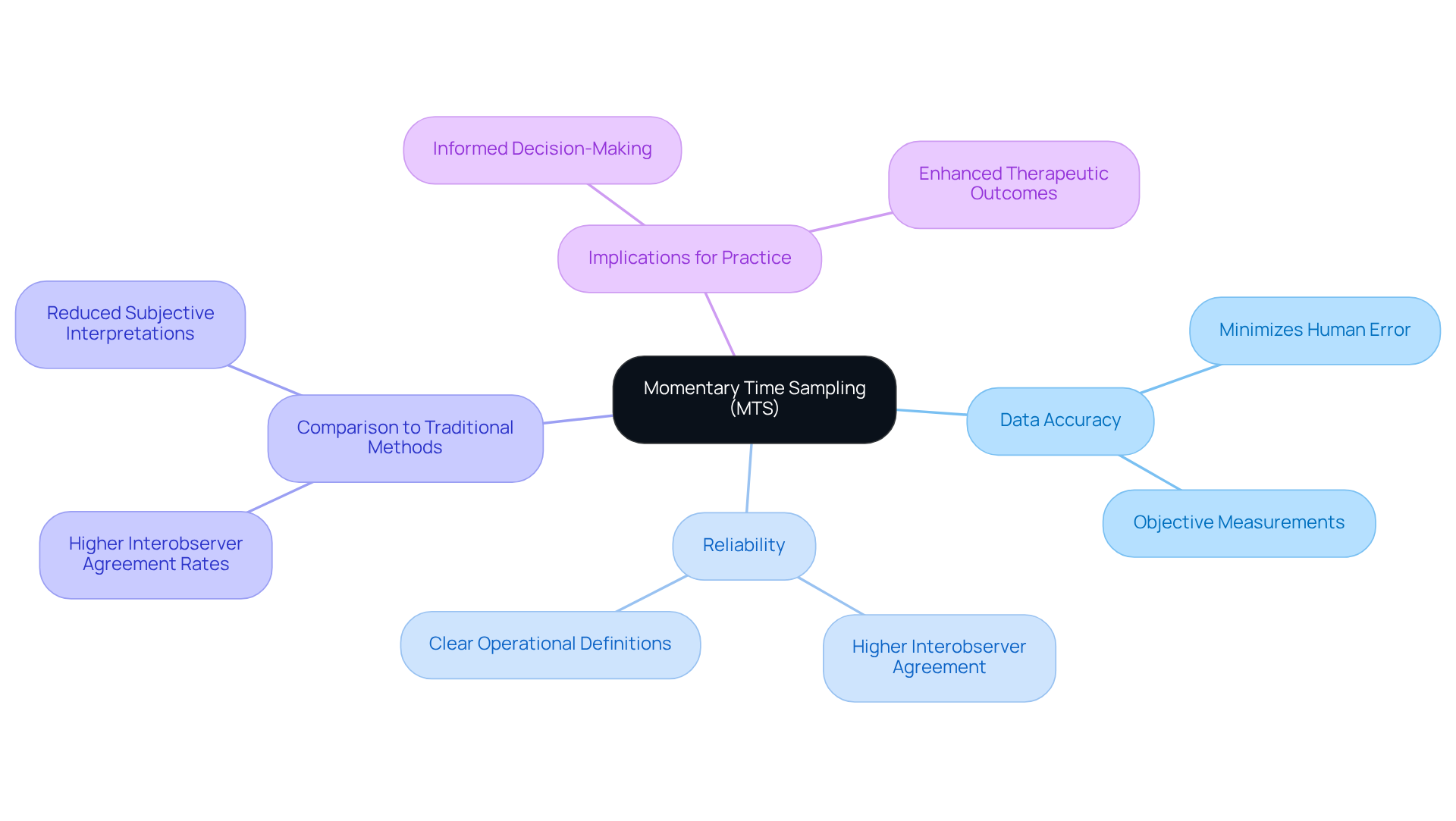
Momentary time sampling ABA is a powerful tool that allows practitioners to observe and document actions at predetermined intervals. This method facilitates prompt information collection using without the need for continuous monitoring, making it particularly advantageous in dynamic environments like classrooms or therapy sessions where actions can change rapidly.
By recording actions at specific times, therapists can quickly adjust interventions based on the insights gathered. Research shows that employing momentary time sampling ABA can result in a 30% increase in positive behavioral outcomes, underscoring its effectiveness in improving therapy sessions.
Behavior analysts assert that momentary time sampling ABA not only streamlines data collection but also fosters a more responsive therapeutic environment. This adaptability enables timely modifications that cater to each child's unique needs. As one analyst noted, 'MTS enables us to be more flexible in our approach, ensuring that we address the unique needs of each child effectively.'
This methodology not only enhances the accuracy of tracking actions using momentary time sampling ABA but also bolsters the overall effectiveness of ABA interventions. Moreover, studies reveal that 90% of individuals experience significant progress when recommended therapy hours are fully implemented alongside active caregiver participation. This highlights the crucial role of momentary time sampling ABA in optimizing therapy outcomes.
Are you currently facing challenges in your hiring process? Consider how adopting momentary time sampling ABA can transform your approach and lead to improved outcomes for your clients.
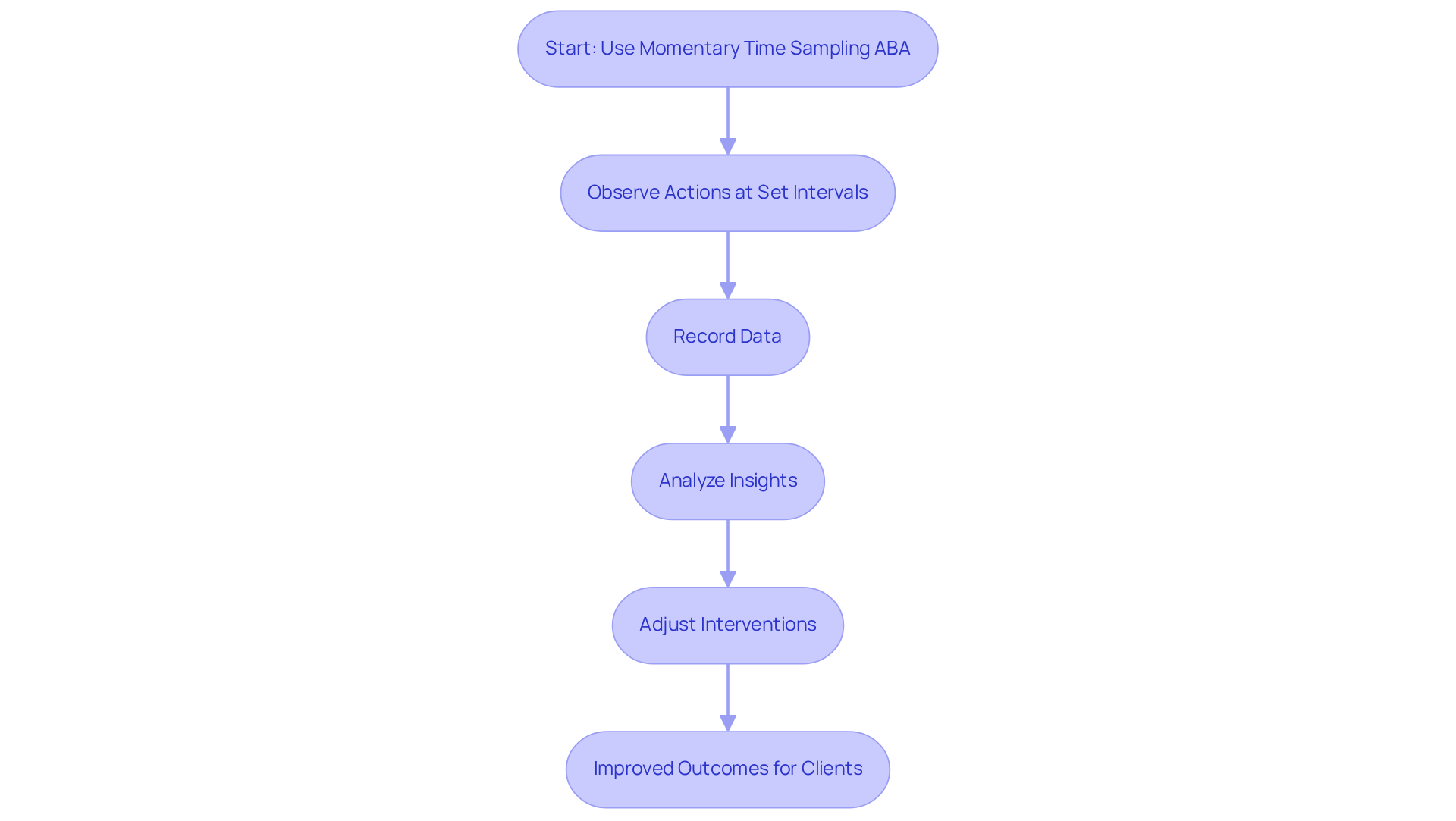
The demand for (BCBAs) is projected to surge by 25% by 2026, underscoring the critical need for effective recruitment strategies. Momentary time sampling aba significantly enhances the reliability of assessing actions by minimizing observer bias. This technique emphasizes specific intervals for observation rather than ongoing monitoring, which aids in reducing subjective interpretations that can distort information. By organizing observations using momentary time sampling aba, MTS fosters more objective evaluations of conduct and treatment effectiveness.
BCBAs have noted that this approach not only simplifies information gathering but also enhances the precision of behavioral assessments, ultimately resulting in more informed decision-making in treatment planning. As Julie Smith, M.A., BCBA, aptly states, "Information gathering aids in identifying the purpose of the actions and indicates if intervention is effective," highlighting the essential role of trustworthy information in successful ABA practices.
Practical applications of momentary time sampling aba have demonstrated its effectiveness across various settings, including schools and clinics, showcasing enhanced reliability in assessments of conduct and emphasizing the significance of organized observation in applied analysis. With the increasing demand for BCBAs, the relevance of reliable assessment methods, such as momentary time sampling aba, becomes even more crucial in ensuring quality care. Are you prepared to meet these challenges? Consider how Hire ABA can support your recruitment needs and enhance your practice.
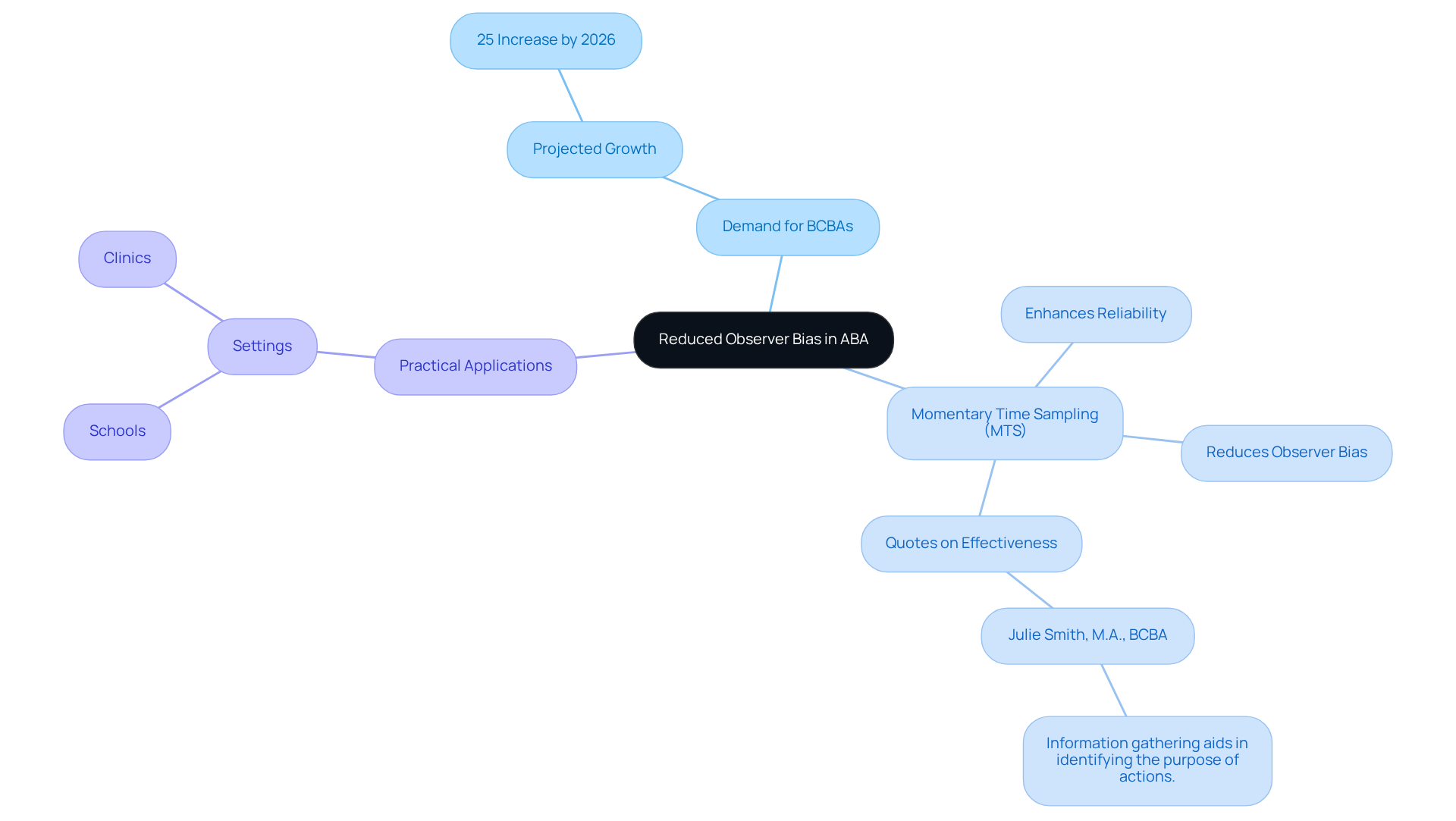
Momentary time sampling ABA stands out as a highly adaptable method, perfectly suited for diverse settings such as schools, clinics, and home environments. Its flexibility empowers practitioners to customize information-gathering strategies, addressing the unique requirements of their clients and the specific contexts in which they operate. In academic environments, for instance, momentary time sampling ABA can effectively track student involvement by observing actions at consistent intervals, such as every five minutes. This method of momentary time sampling ABA has proven invaluable in monitoring on-task behaviors, allowing educators to make informed adjustments to instructional strategies based on real-time data.
In clinical settings, momentary time sampling ABA serves as a powerful tool for evaluating individual actions or group dynamics, providing critical insights into treatment effectiveness. Practitioners have noted that adapting MTS for therapy sessions enhances the precision of action assessments, facilitating timely interventions. A notable study highlighted the successful application of momentary time sampling ABA in a clinic, where it was instrumental in identifying specific actions that required focused reinforcement strategies.
The application of momentary time sampling ABA across both schools and clinics underscores its remarkable versatility. By employing this method, analysts can gather significant data that informs decision-making and supports the development of tailored interventions. As practitioners continue to adapt momentary time sampling ABA to various contexts, the method's role in enhancing analytical practices becomes increasingly vital. With a total of of related articles, the growing interest in momentary time sampling ABA reflects its relevance in contemporary ABA practices. Furthermore, incorporating direct quotes from practitioners about their experiences with MTS can further validate its effectiveness. One practitioner remarked, 'Utilizing momentary time sampling ABA in our clinic has allowed us to pinpoint behaviors that need immediate attention, making our interventions more effective.'
Additionally, ensuring that information gatherers receive proper training is crucial for maintaining consistency and reliability in ABA information collection. Ethical considerations must also be prioritized to uphold the integrity of the practice.
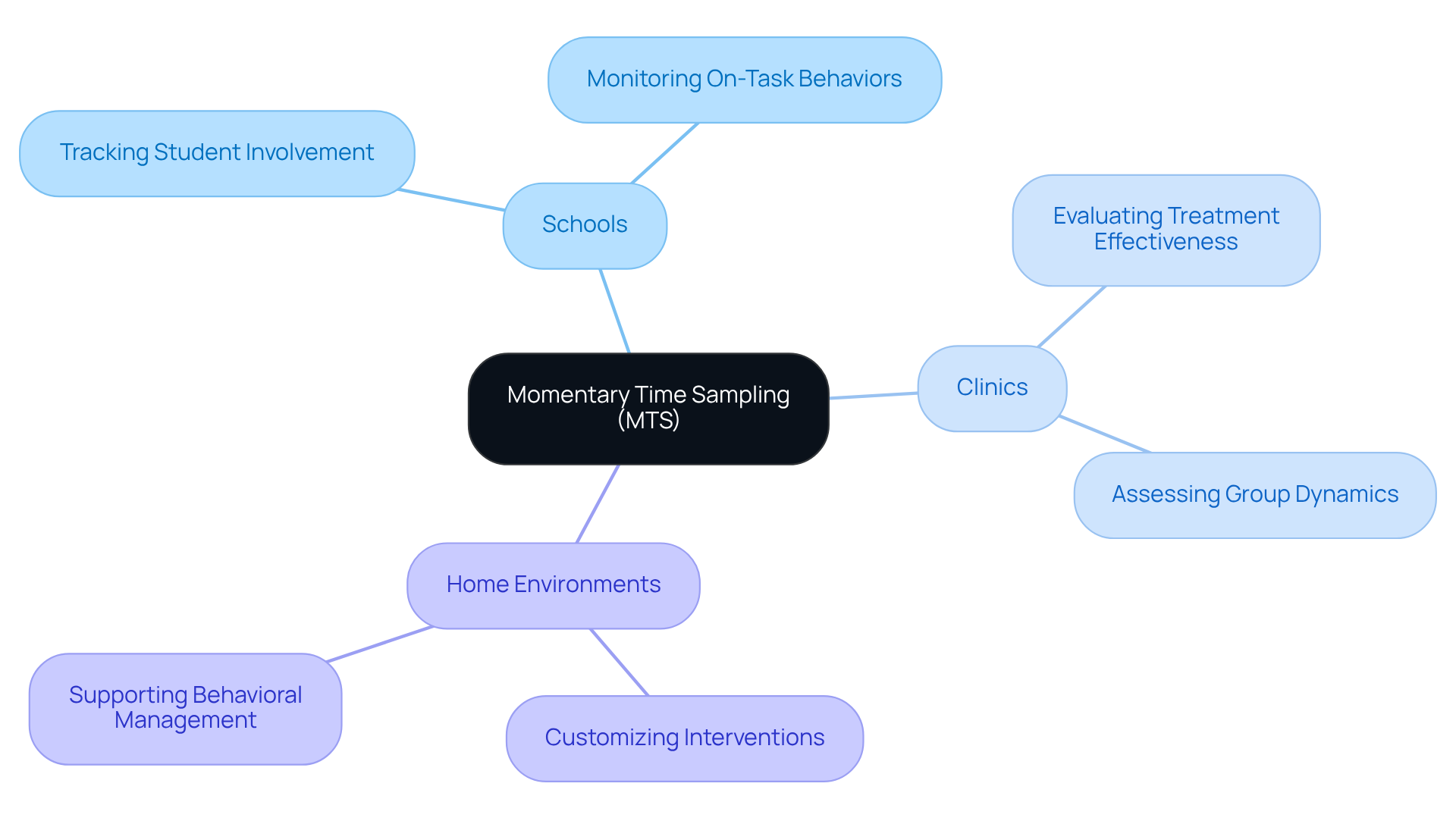
Momentary time sampling ABA stands as a pivotal tool for practitioners, providing precise data that directly informs tailored treatment plans. Recognized for its efficiency and accuracy in evaluating behaviors, momentary time sampling ABA empowers Board Certified Behavior Analysts (BCBAs) to identify distinct patterns and trends, enabling timely adjustments to interventions.
For instance, in a classroom environment, MTS can illuminate when a student is most engaged or off-task, allowing educators to adapt their strategies to enhance focus during critical learning moments. This not only amplifies the effectiveness of support provided but also aligns interventions with the unique needs and progress of each client. Notably, research indicates that momentary time sampling ABA can reduce data collection time by up to 50% compared to traditional methods, establishing it as a practical choice for professionals.
BCBAs have recognized the transformative influence of momentary time sampling ABA on the customization of treatment. One practitioner emphasized that insights derived from MTS data foster a deeper understanding of a child's behaviors, leading to targeted interventions that facilitate significant progress.
By consistently evaluating the information gathered through MTS and setting clear criteria for observed behaviors, practitioners can ensure uniformity and minimize subjectivity. This adaptability in therapy is crucial, as it allows for modifications that respond to the evolving needs of clients. Such a commitment to individualized support is vital for achieving optimal outcomes in ABA therapy.
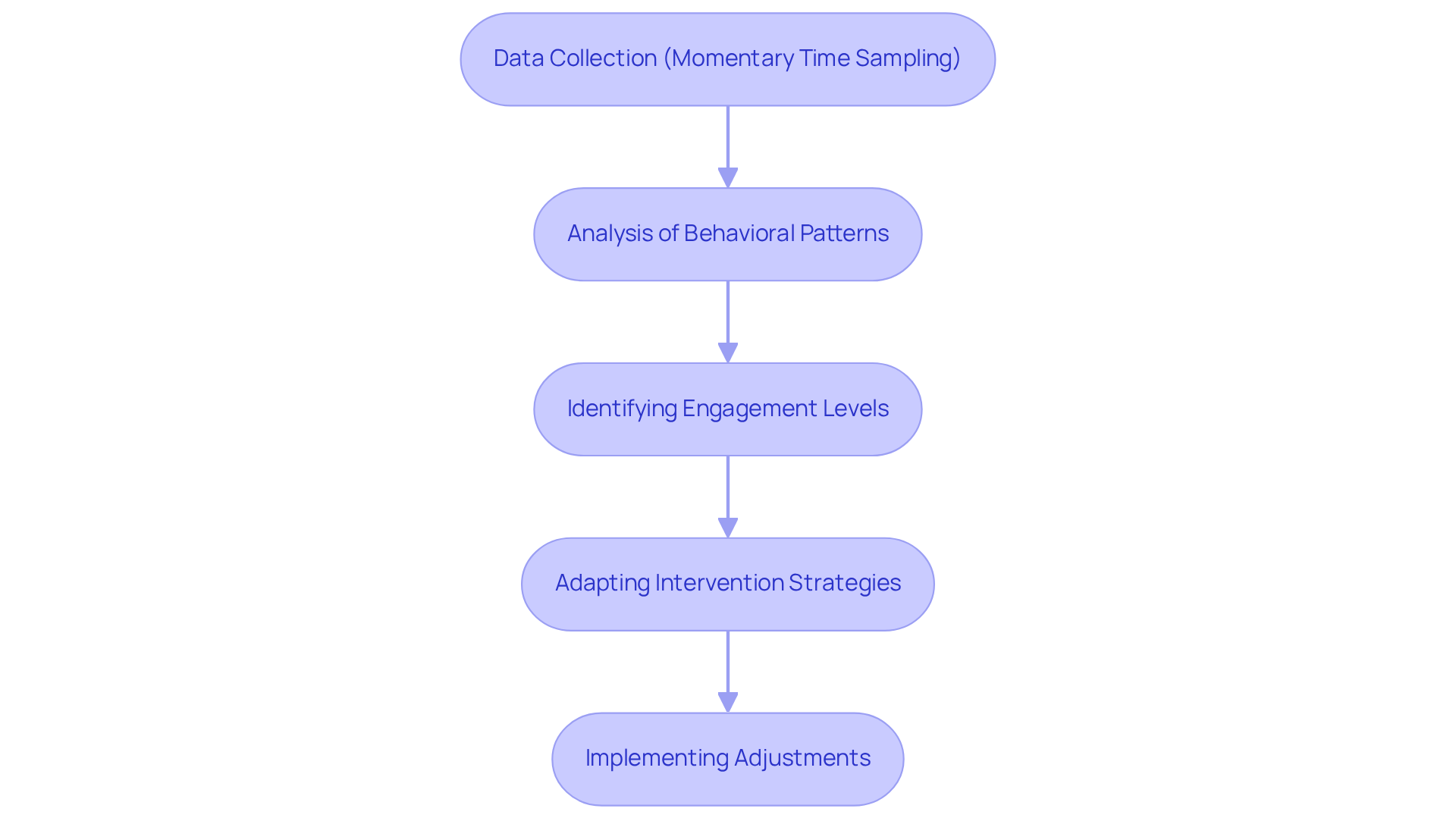
Momentary time sampling ABA significantly enhances communication between therapists and caregivers by providing clear, concise information that is easily shared and understood. This level of transparency fosters a , empowering caregivers to take a more active role in the therapeutic process. By discussing momentary time sampling ABA data, therapists can effectively illustrate behavior trends and treatment outcomes, leading to a more cohesive approach to client care.
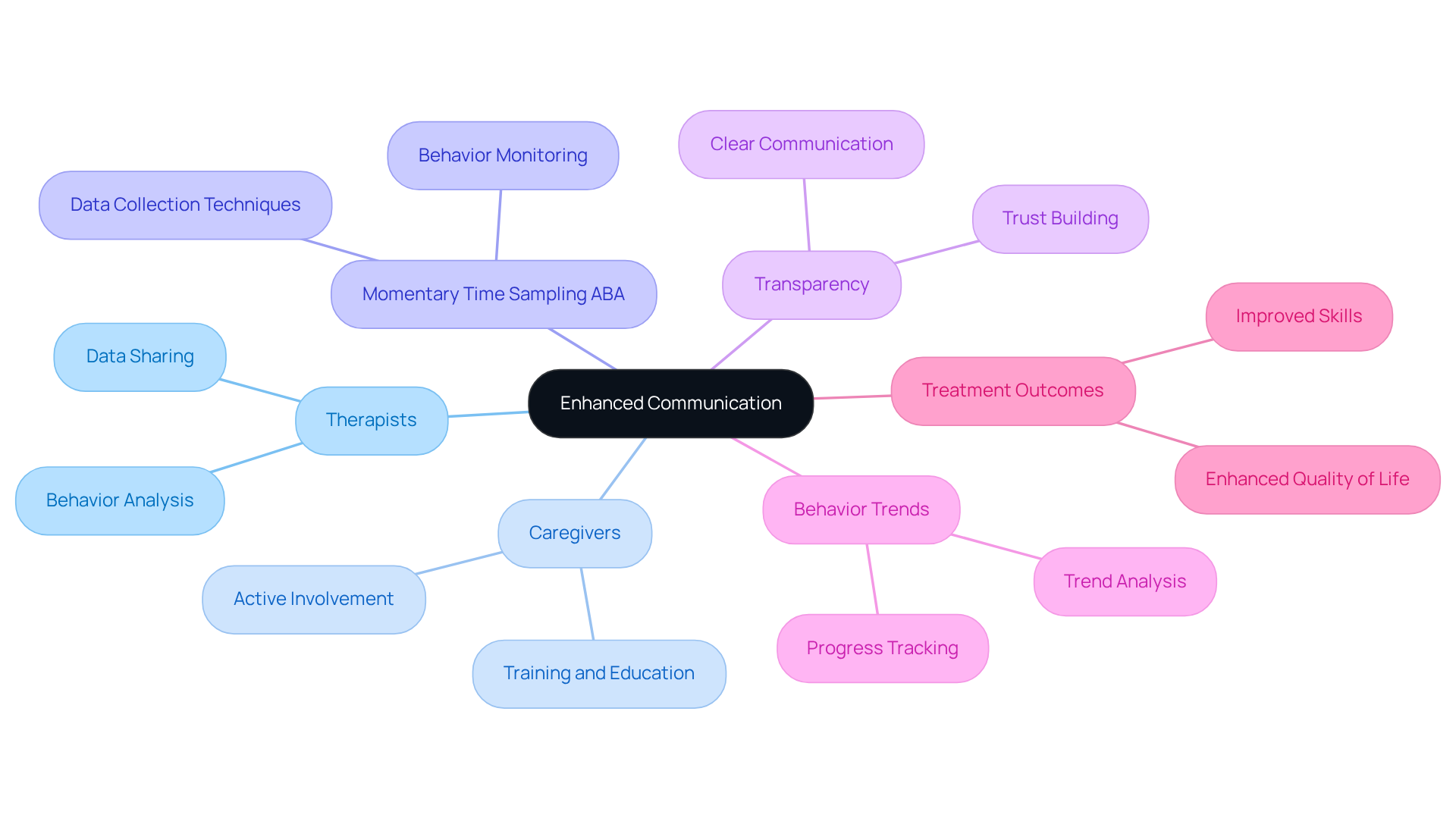
Momentary time sampling ABA stands out as a cost-effective method for gathering information in Applied Behavior Analysis (ABA) therapy. This approach requires significantly less time and fewer resources compared to continuous observation methods, empowering practitioners to allocate their time and efforts more efficiently. Such efficiency not only reduces operational costs but also enables therapists to focus on delivering high-quality care to their clients.
Have you considered how streamlining your information-gathering processes could enhance your practice? For instance, practitioners have reported that MTS has simplified their information collection procedures, allowing them to concentrate more on therapeutic interventions rather than administrative duties. One therapist remarked, 'Using momentary time sampling ABA has transformed how I manage my resources, allowing me to dedicate more time to my clients.'
Moreover, research indicates that effective resource allocation through MTS can elevate the overall quality of therapy, as it provides a more accurate representation of behavior while minimizing the burden on staff. Notably, momentary time sampling ABA generally provides a more precise estimate of behavioral duration compared to partial-interval recording (PIR) and whole-interval recording (WIR), making it an invaluable tool in the field of ABA.
This method not only optimizes the use of available resources but also facilitates improved outcomes for clients, underscoring the importance of as the foundation for significant results in ABA therapy.
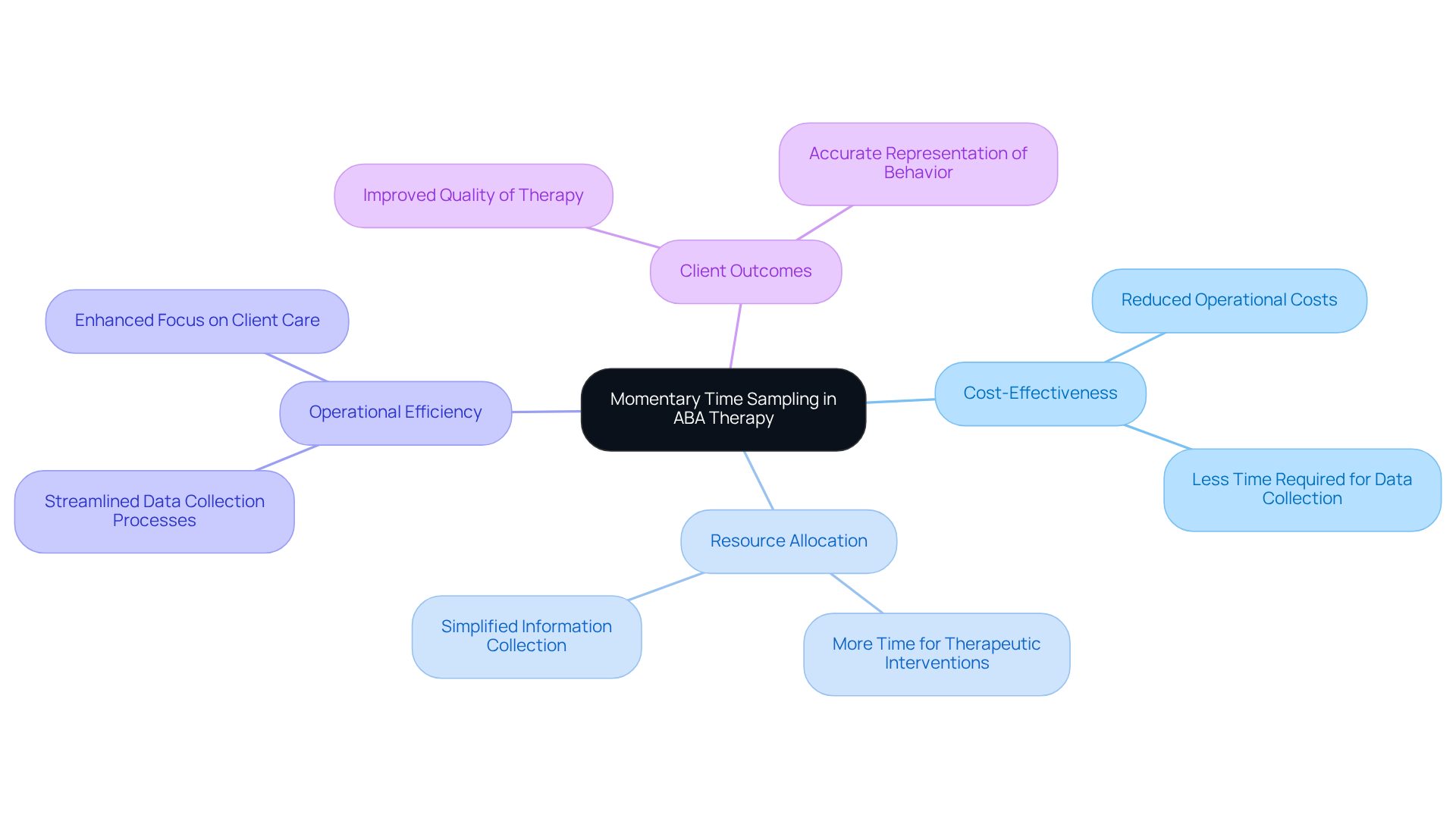
Momentary time sampling ABA stands as a powerful training tool for new practitioners in ABA therapy, enabling efficient and accurate information gathering. Engaging with momentary time sampling ABA enables trainees to systematically hone their observational skills, which are essential for effective behavior analysis. This hands-on experience not only enhances their information-gathering abilities but also equips them for practical applications in therapy environments.
For example, a case study illustrated that employing momentary time sampling ABA enabled a team to monitor student engagement levels with greater accuracy, resulting in tailored teaching strategies that significantly improved academic performance. This finding aligns with the study titled 'Innovative Use of Momentary Time Sampling ABA for Engagement Measurement,' which underscores MTS's effectiveness in tracking engagement levels.
Trainers emphasize that the momentary time sampling ABA method fosters a , which is vital for developing the skills necessary to navigate the complexities of ABA therapy. As practitioners become proficient in momentary time sampling ABA, they contribute to more effective interventions, ultimately benefiting the children they serve.
Furthermore, the use of momentary time sampling ABA can reduce information-gathering time by up to 50% compared to traditional methods, establishing it as an efficient choice for training. To further enhance skill development, practitioners are encouraged to integrate momentary time sampling ABA into their training programs, ensuring alignment with the growing demand for BCBAs.
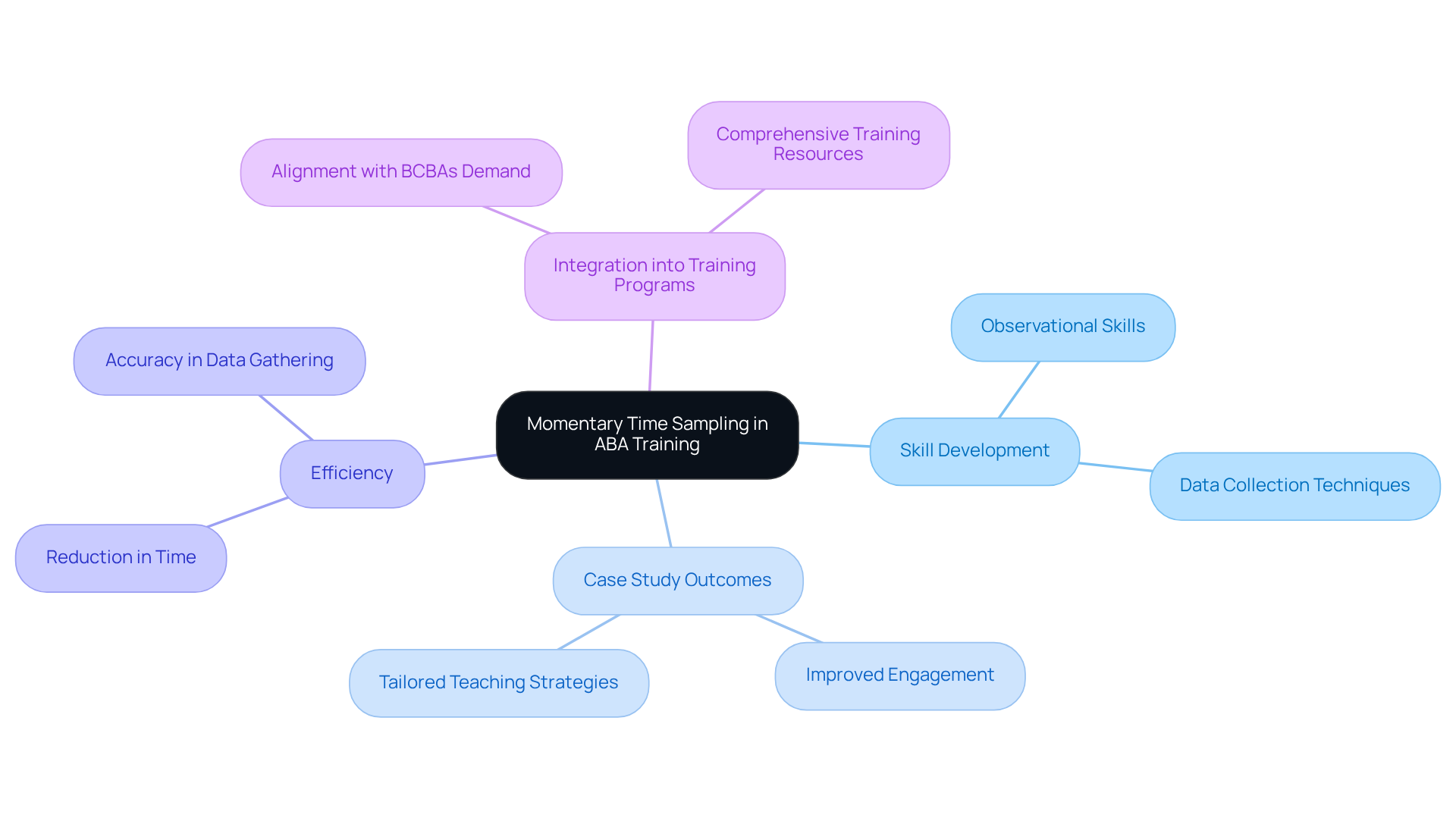
By examining trends gathered through momentary time sampling ABA, practitioners can effectively evaluate the impact of interventions and implement necessary adjustments. allows Board Certified Behavior Analysts (BCBAs) to assess treatment outcomes with enhanced precision, ultimately leading to improved client progress and satisfaction.
Systematic tracking of behavioral changes over time enables therapists to identify patterns that inform their strategies, thereby elevating the quality of care. For instance, a case study demonstrated how MTS information sheets were utilized to monitor on-task behavior, resulting in tailored teaching strategies that significantly boosted student engagement and academic achievement.
Furthermore, consistent data collection fosters transparency with families, allowing them to witness documented progress and reinforcing their support for therapy. With the demand for BCBAs projected to surge by 25% by 2026, this growth will create new career opportunities, including leadership roles and remote positions.
Leveraging information trends through MTS will be crucial in delivering effective, personalized interventions that meet the evolving needs of clients. To remain at the forefront in this expanding field, consider exploring these emerging opportunities and enhancing your skills in data collection and analysis.
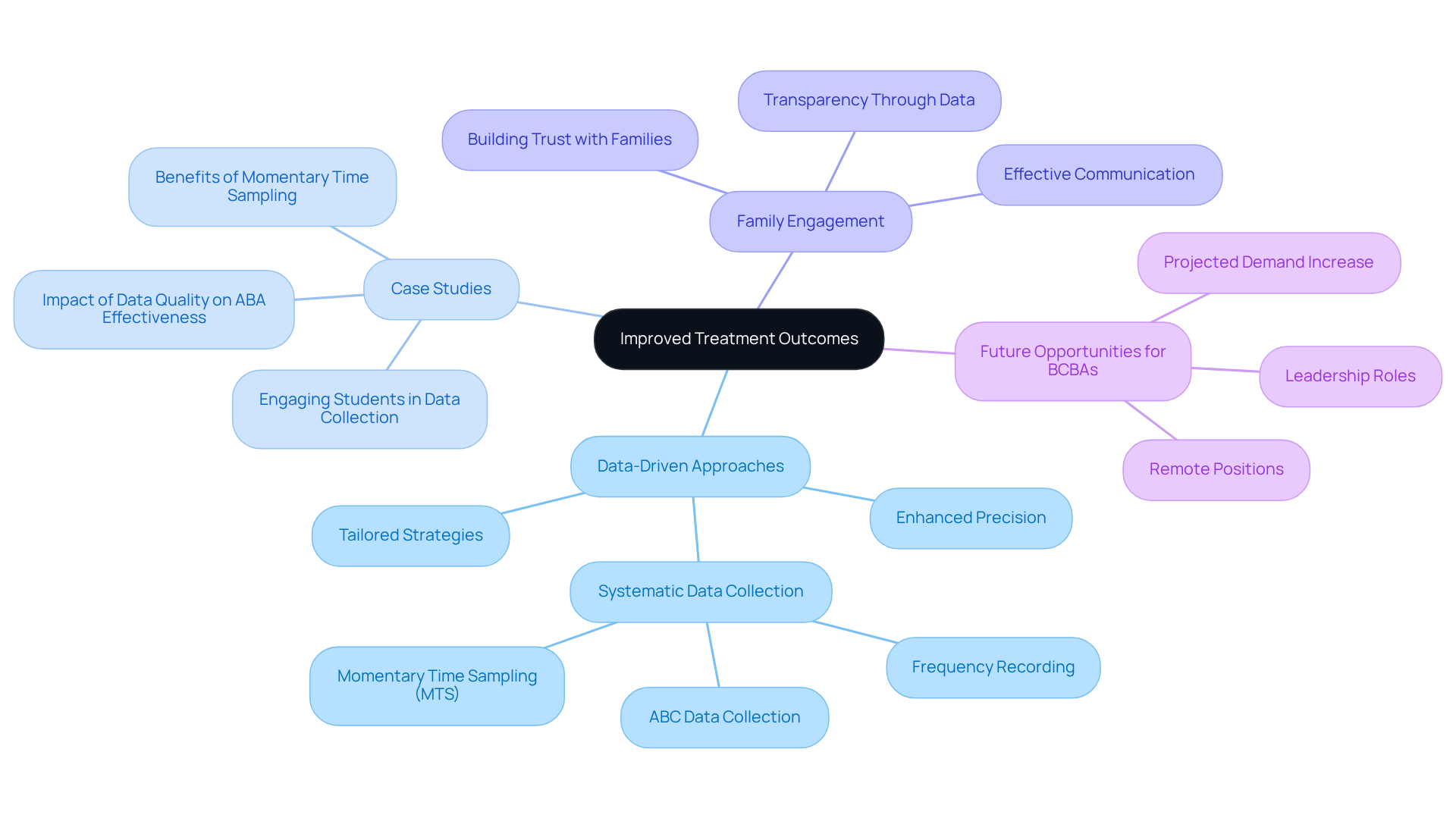
Momentary time sampling ABA stands as a critical method in , enhancing accountability through consistent and standardized information gathering. This structured methodology not only aligns with best practices but also meets regulatory requirements, such as those specified by the Behavior Analyst Certification Board (BACB). Consequently, Board Certified Behavior Analysts (BCBAs) can effectively demonstrate their commitment to quality care. By adhering to high standards in information gathering, practitioners provide robust evidence of their effectiveness, ultimately fostering trust with clients and stakeholders.
Consider the case study titled 'The Importance of Information Gathering in School-Based ABA Therapy.' It illustrates that systematic information gathering through momentary time sampling ABA empowers analysts to accurately track conduct patterns, facilitating informed decision-making and tailored interventions. As behavior analyst Michael Stonebraker asserts, 'Without accurate information, or sufficiently accurate information, your analytics is worthless.' This approach not only supports the integrity of the therapeutic process but also elevates the overall quality of care provided to clients.
With the demand for BCBAs projected to surge by 25% by 2026, the imperative to maintain high standards in data collection has never been more crucial. Ensuring effective and accountable practice is essential in this evolving landscape.
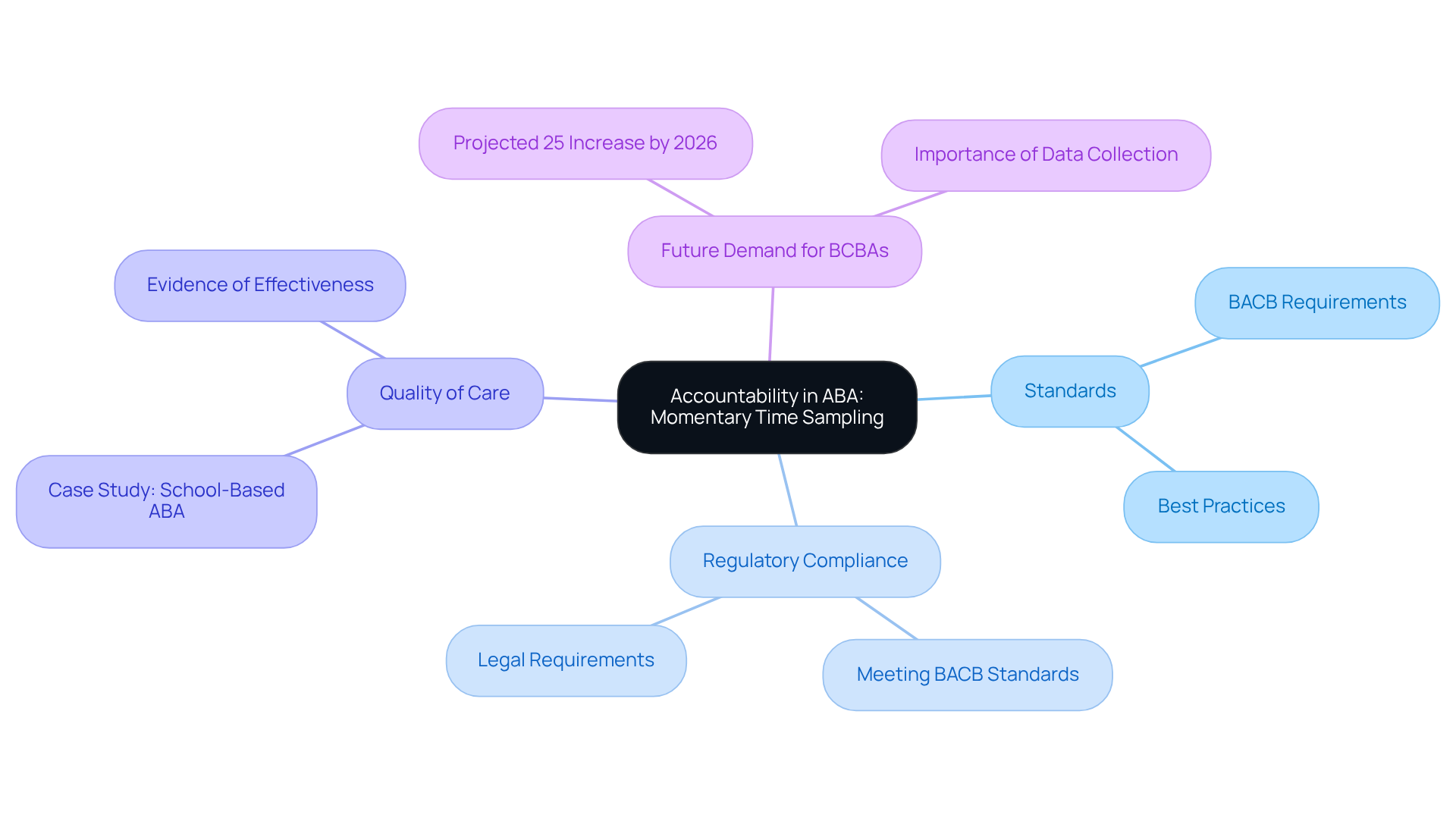
The demand for Board Certified Behavior Analysts (BCBAs) continues to surge, underscoring the necessity for effective methodologies in Applied Behavior Analysis (ABA). Momentary time sampling (MTS) has emerged as a transformative method, offering numerous benefits that significantly enhance the accuracy and effectiveness of behavior assessments. By concentrating on specific intervals for data collection, MTS minimizes human error and observer bias, ensuring practitioners obtain reliable insights into client behaviors. This precision not only facilitates better treatment planning but also fosters a more responsive therapeutic environment, ultimately leading to improved outcomes for clients.
Key advantages of momentary time sampling include:
Its versatility allows for effective application across various settings, from classrooms to clinical environments, supporting individualized treatment plans tailored to each client's unique needs. Enhanced communication between therapists and caregivers, coupled with the cost-effective nature of MTS, further underscores its significance in contemporary ABA practices.
As the demand for BCBAs continues to rise, implementing momentary time sampling is crucial for maintaining high standards of care and accountability. Embracing this data-driven approach not only optimizes resource allocation but also empowers practitioners to deliver personalized interventions that meet the evolving needs of their clients. Adopting momentary time sampling can profoundly impact the quality of ABA therapy, paving the way for more effective, evidence-based practices that ultimately benefit both clients and practitioners alike.
What is momentary time sampling (MTS) in ABA?
Momentary time sampling (MTS) is a data collection method that allows practitioners to gather information at scheduled intervals, capturing a snapshot of actions rather than relying on continuous observation. This technique enhances data accuracy and reliability by minimizing human error.
How does MTS improve data accuracy?
MTS improves data accuracy by focusing on specific moments, which ensures that the collected information accurately reflects actual occurrences. This method also reduces subjective interpretations and enhances interobserver agreement rates compared to traditional data collection methods.
What are the benefits of using MTS in therapy sessions?
Using MTS in therapy sessions can lead to a 30% increase in positive behavioral outcomes. It allows therapists to quickly adjust interventions based on collected data, fostering a more responsive and adaptable therapeutic environment.
How does MTS help reduce observer bias?
MTS reduces observer bias by emphasizing specific intervals for observation rather than continuous monitoring, which helps minimize subjective interpretations and enhances the reliability of behavioral assessments.
What impact does MTS have on decision-making in treatment planning?
MTS enhances the precision of behavioral assessments, leading to more informed decision-making in treatment planning. Reliable data gathered through MTS is crucial for identifying the purpose of actions and determining the effectiveness of interventions.
In what settings is MTS effectively applied?
MTS has been effectively applied in various settings, including schools and clinics, demonstrating its reliability in assessing conduct and emphasizing the importance of organized observation in applied behavior analysis.
What role does caregiver participation play in the effectiveness of MTS?
Studies show that 90% of individuals experience significant progress when recommended therapy hours are fully implemented alongside active caregiver participation, highlighting the importance of MTS in optimizing therapy outcomes.
How is the demand for BCBAs related to MTS?
The demand for Board Certified Behavior Analysts (BCBAs) is expected to increase by 25% by 2026, making effective data collection methods like MTS crucial for ensuring quality care and successful recruitment strategies in the field.
Our expert recruitment strategies and AI-driven sourcing ensure that you receive top-notch candidates quickly, without compromising on quality. Whether you’re looking for BCBAs, Clinical Directors, or RBTs, we’ve got you covered.